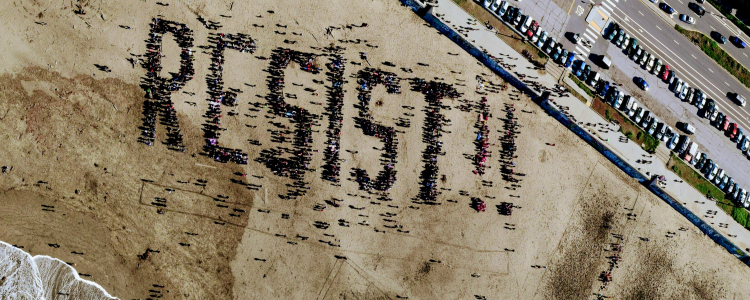Recognizing and Resisting Diet Culture
Diet Culture is dangerous and harms people of all sizes, including by perpetuating eating disorders and making a full recovery almost impossible. But when it comes to identifying Diet Culture in a world that is sadly rife with it, there can be plenty of confusion. If we truly want to prevent eating disorders and create a culture where full recovery is possible, we need to learn to identify Diet Culture and speak out against it. While this list certainly isn’t exhaustive, it covers some of the main tenets of Diet Culture, as well as some options for fighting back.
Diet Culture conflates size and health, pathologizing some body sizes
Weight stigma is so firmly entrenched in our culture that even healthcare professionals often substitute fatphobia for actual diagnoses, and substitute diets for the evidence-based interventions that a thin person with the same health issues would receive.
Resisting Diet Culture
When you see someone pathologizing fat bodies, you can explain that there are healthy and unhealthy people of every shape and size, and that adding healthism to sizeism is not a good look. Point out that what’s important is that people of all sizes have access to ethical, evidence-based care, and that weight loss recommendations aren’t prescribed for health issues. As the brilliant Deb Burgard has pointed out, “We prescribe for fat people what we diagnose as disordered in thin people.”
This is dangerous for fat people who are prescribed disordered eating behaviors, for people of all sizes who live in a world where disordered eating behaviors are normalized, for not-fat people with eating disorders who are given the message that if they were fat their eating disorder behaviors would be not just be appropriate, but beneficial and doctor approved, and for fat people with eating disorders who are given behavior prescriptions that celebrate their eating disorders and make them even more entrenched. Pair that with body dysmorphia and/or an extreme fear of becoming fat and diet culture quickly becomes deadly. This is why a Size Acceptance/Health at Every Size® paradigm is the only acceptable paradigm.
Diet Culture encourages following external rules about what, when, and how much to eat
Another aspect of diet culture is the use of food rules and restriction to manipulate body size—either to make sure one doesn’t become fat, or to try to make fat people thin. In addition to the fact that only a tiny fraction of people can manipulate body size long-term in this way, these are all red flag behaviors for eating disorders.
Resisting Diet Culture
When you see this suggestion, you can remind people that food has plenty of appropriate uses in our culture, including nourishment, celebration, and emotional eating, but trying to manipulate our body size is not one of them. If someone is looking for help around this, you can recommend a HAES-based dietitian.
Diet Culture suggests that people are more or less good/moral/worthy based on their body size
The government-funded “war on obesity” is based on telling everyone that a fat person will ever meet, along with fat people themselves, that fat people should be stereotyped, shamed, stigmatized, and harassed. The result is that people actually believe that a thin body is more attractive, more worthy, and better than a fat body, and behave accordingly, leading to size-based oppression, including internalized oppression
Resisting Diet Culture
A great comeback to this is to point out that all bodies are good bodies and that, as anti-Diet-Culture warrior Marilyn Wann has famously pointed out, “The only thing anyone can diagnose by looking at a fat person is their own level of prejudice toward fat people.”
Diet Culture creates thin privilege, which makes thinness a gatekeeper for jobs/benefits/comfort/accommodation
If you expect that you can enter a restaurant, public transportation, roller coaster, doctor’s waiting room, Broadway play, or flight and find a seat that accommodates you, you have thin privilege. And that’s just one example. Thin privilege is created by a world that is based upon accommodating thin people, and seeing thin bodies as more deserving than fat bodies.
Resisting Diet Culture
Like all privilege, most thin people didn’t ask for it, and can’t give it away, but they can use it to fight Diet Culture. An excellent use of thin privilege is to find out what fat people want that thin people already have, and then ask how to help. For example, when someone says, “I can’t believe that a fat person thinks that they should get to travel from point A to point B on this plane for the same price as I do,” say “Why do we get seats that accommodate us, but other people are asked to pay twice as much for the same trip? That’s not fair.” Then do things from signing petitions and getting involved in activism, to interrupting fatphobia on planes and welcoming fat people to sit next to you.
Diet Culture suggests movement as punishment for, or prevention of, being fat, rather than for other reasons like fun, or personal goals
If I had a nickel for every person who had a messy breakup with exercise because of a fatphobic gym teacher, I would be rich. Diet Culture throws things like joyful movement out the window in order to talk about movement as a way to manipulate body size. It also encourages people to stereotype fat people involved in movement, leading to fat people doing the workouts we’ve been doing for years interrupted by people gushing about how proud they are that we have “started a workout program” and how we’ll “lose that weight in no time.”
Resisting Diet Culture
Let’s be clear: nobody is obligated to participate in fitness of any kind, not everyone has the same access to movement options, and participation in movement is not a barometer of worthiness. As someone who has finished two marathons (and holds the Guinness World Record for Heaviest Woman to Complete a Marathon) I can tell you for sure that running a marathon and having a Netflix marathon are morally equivalent activities. When it comes to movement, we should work hard to make sure everyone has access to the information and movement options they may want, and then mind our own business.
Diet Culture views fat people as less valuable and more risk-able
Fat people who have health issues often find their healthcare practitioner recommending that they have their stomachs amputated or bound (also known as “bariatric surgery”) or prescribing diet drugs, despite the fact that these can kill people, often have horrific lifelong side effects for those who survive them, and offer no guarantee of effective treatment of actual health issues. Thin people with these same health issues are given evidence-based interventions and are never asked to risk their life and quality of life. Diet Culture creates a belief that it’s ok to risk the life of a fat person in order to make them a thin person. Diet Culture wants fat people to be thin or dead, and doesn’t seem to care much which.
Resisting Diet Culture
We can interrupt this by insisting that fat people receive the same evidence-based interventions as thin people, and by never suggesting that it’s appropriate to risk a fat person’s health—physical or mental—in an effort to turn them into a thin person.
Diet Culture is dangerous for people of all sizes, and particularly dangerous to those with a predisposition for, currently suffering with, or recovering from eating disorders. The eating disorders community needs to lead the dismantling of Diet Culture (including within our own community) and in transforming the world into a place that values all bodies.
Join the NEDA Network in rejecting diet culture by promoting No Diet Day on May 6th.
Ragen Chastain is a speaker, writer, activist, Certified Health Coach, and thought leader in the fields of Health at Every Size, Size Acceptance, and Corporate Wellness. Ragen has brought her captivating and motivating mix of humor and hard facts to stages including Google Headquarters, CalTech, and IvyQ. Author of the blog danceswithfat, the book Fat: The Owner’s Manual, and editor of the anthology The Politics of Size, Ragen is frequently featured as an expert in print, radio, television, and documentary film. Ragen is a three-time National dance champion, and two-time marathoner who holds the Guinness World Record for Heaviest Person to Complete a Marathon (Female,) and co-founded the Fit Fatties and the Fat Activism Conference. Ragen lives in LA, and is currently training for her first (and only!) IRONMAN Triathlon.
Author image by Lindley Ashline @sweetamaranth





